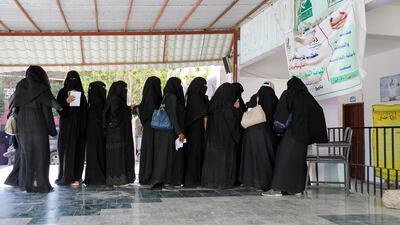Yemen's Houthi rebels cancelled their decision to impose a levy on humanitarian assistance to areas under their control after an international outcry and over fears they would lose control over aid transfers, according to government and UN officials.
The Iran-backed rebels sent a letter to the UN agencies in Yemen last week to announce that they proposed to impose a 2 per cent tax on aid, an official from the UN's humanitarian affairs office told The National. But the rebels dropped their demand in a letter sent to the UN on Friday, the official said.
The head of UN aid agencies had threatened to reduce humanitarian programmes in Houthi-controlled areas in response to “unprecedented” harassment by the rebels and concerns that the aid did not reach the needy.
Faced with international outrage, Houthis media outlets toned down their criticism of UN humanitarian missions in Yemen since Friday, a day after aid agencies met in Brussels to discuss a freeze in aid.
Last week, Houthi-controlled channels were accusing the UN agencies of distributing spoilt food and cancer-causing drugs. Sheba TV broadcast interviews with Houthi health officials who claimed that medical facilities in Sanaa, the rebel-held capital, were given expired vaccinations. Other shows claimed that UN aid workers in Yemen were spies and missionaries.
Officials in Aden, the base of the internationally-recognised government, said that they predicted the Houthis would bow to pressure given the huge benefits the rebels garner from the transfer of humanitarian funding and supplies through their territory.
"The budgets of all UN bodies in Yemen go through the central bank in Sanaa. We have long demanded that the UN transfer the money to the central bank in Aden, but they refuse," an official in the government told The National.
Almost 70 per cent of the country’s imports including humanitarian aid come through Hodeidah port, from which the Houthis generate millions of dollars annually by taxing ships and lorry deliveries. The rebels were supposed to hand over control of the port to the UN but government officials say this has not happened.
Diverting ships carrying humanitarian aid to the port in Aden would cut off a vital source of financing for the rebels, which the government and the Saudi-led coalition have long sought to do, said the official, who declined to be named.
The Minister of Local Administration Abdul Raqeb Fateh, who also heads the government agency that handles aid, warned this week that any reduction of aid to the densely areas under Houthi control would aggravate the already dire humanitarian situation in Yemen and urged UN agencies to move their food stores to liberated areas.
The minister described Houthi-controlled areas as an “unsafe environment” and held the rebels responsible for obstructing distribution of aid in northern Yemen, in comments reported by the state news agency Saba on Wednesday.
Mr Fateh said President Abdrabu Mansur Hadi had ordered his government to provide UN workers with any assistance needed to help them smoothly deliver aid.
Last year, the minister accused the Houthis of diverting more than 60 per cent of humanitarian aid intended for civilians to their fighters on the battle fronts. The claim was confirmed by reports prepared by local and international right groups.

